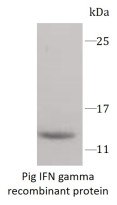ARG70410
Pig IFN gamma recombinant protein (Active) (His-tagged, C-ter)
Pig IFN gamma recombinant protein (Active) (His-tagged, C-ter) for SDS-PAGE
Overview
| Product Description | E. coli expressed, His-tagged (C-ter) Active Pig IFNG recombinant protein |
|---|---|
| Tested Application | SDS-PAGE |
| Target Name | IFN gamma |
| Species | Pig |
| A.A. Sequence | Gln23 - Lys166 |
| Expression System | E. coli |
| Protein Full Name | Interferon gamma |
| Activity | Active |
| Activity Note | Determined by its ability to protect PK15 cells infected with encephalomyocarditis (EMC) virus. The ED50 for this effect is < 40 pg/mL. |
| Alternate Names | IFNG; Interferon Gamma; Immune Interferon; IFN-Gamma; IMD69; IFG; IFI |
Properties
| Form | Powder |
|---|---|
| Purification Note | Endotoxin level is < 0.01 EU/µg of the protein, as determined by the LAL test. |
| Purity | > 95% (by SDS-PAGE) |
| Buffer | PBS (pH 7.4) |
| Reconstitution | It is recommended to reconstitute the lyophilized protein in sterile water to a concentration not less than 200 μg/mL and incubate the stock solution for at least 20 min at room temperature to make sure the protein is dissolved completely. |
| Storage Instruction | For long term, lyophilized protein should be stored at -20°C or -80°C. After reconstitution, aliquot and store at -20°C or -80°C for up to one month. Storage in frost free freezers is not recommended. Avoid repeated freeze/thaw cycles. Suggest spin the vial prior to opening. |
| Note | For laboratory research only, not for drug, diagnostic or other use. |
Bioinformation
| Gene Symbol | IFNG |
|---|---|
| Gene Full Name | Interferon Gamma |
| Background | This gene encodes a soluble cytokine that is a member of the type II interferon class. The encoded protein is secreted by cells of both the innate and adaptive immune systems. The active protein is a homodimer that binds to the interferon gamma receptor which triggers a cellular response to viral and microbial infections. Mutations in this gene are associated with an increased susceptibility to viral, bacterial and parasitic infections and to several autoimmune diseases. |
| Function | Type II interferon produced by immune cells such as T-cells and NK cells that plays crucial roles in antimicrobial, antiviral, and antitumor responses by activating effector immune cells and enhancing antigen presentation. |
| Cellular Localization | Secreted |
| PTM | Cleavage on pair of basic residues, Glycoprotein, Pyrrolidone carboxylic acid |
Images (1) Click the Picture to Zoom In






